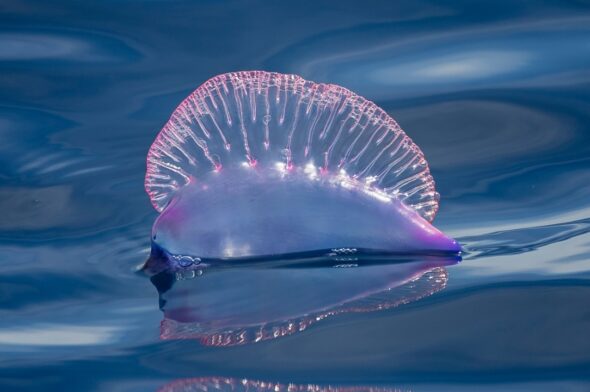What is the Portuguese Man O’War and why we shouldn’t be afraid of it
How to recognise it and what to do if you get stung

How to recognise it and what to do if you get stung
It wasn’t enough to have the “usual” sightings of sharks, which are mostly innocuous. This summer sees, in Italian waters, the arrival of another ‘boogeyman’: the Portuguese man o’ war. National and local media have talked a lot about sightings of the sea creature, highlighting its most dangerous aspects. Aspects, that undoubtedly exist, considering that, just over a week ago on Isola Ciclopi in Sicily, a swimmer ended up in hospital after being stung by this strange animal.
Another episode, this time deadly, happened in 2010 along the coast of Sardinia. But, contrary to what some media outlets have said, the Portuguese man o’ war, whose scientific name is Physalia physalis, has always been present in our waters. So much so that in the archives of Italian museums there are a number of documents that tell how this creature, found mostly in the Atlantic and Pacific oceans, has been visiting the Mediterranean basin since the XIX century.
That’s its presence in our waters, caused by climate change and impoverished native fauna, is increasingly frequent is a plausible hypothesis but it is still being examined by marine biologists. The point is, however, that even though you shouldn’t be afraid of the man o’ war, you should still know what to do in case you meet one, and how to behave in the unlucky chance you get stung.
Let’s begin with the fact that, even if it looks like one, the man o’ war is not a jellyfish but a siphonophore. “It is a colonial pleustonic organism, formed by a group of specialised polyps that live by floating on the water’s surface thanks to a ‘bag’ of gas with a slightly flattened shape, which works as a sail, known as a pneumatafor,” the marine biologist, Francesco Tiralongo, professor at the University of Catania, explains in Frontiers in Marine Science.
In other words, as its name implies, the man o’ war is a sort of ‘vessel’ transporting thousands of tiny stinging organisms attached to tentacles that can reach a length of 30 metres. And it is these that are dangerous to swimmers, because, differently from jellyfish, it is hard to notice their presence while swimming.
Contact with a man o’ war causes painful skin lesions and, although rare, it can also cause anaphylactic shock in those who are prone. It can also cause, in the following hours, various other respiratory symptoms like difficulty breathing, arrhythmia and vomiting. Let’s remember that in any case, Portuguese man o’ war stings can be lethal only in those who have previous pathologies.
What to do if you get stung? The best thing is to immediately remove any tentacle from the skin, being careful not to touch it with your hands, wash abundantly with sea water and then place a warm compress on the injury. Naturally, it is best to go to the emergency room at the nearest hospital as soon as possible.
The man o’war is not a jellyfish, so it is counter-productive to wash the sting with vinegar, lemon juice or ammonia, which only increases the amount of toxins released. An urban legend suggests…peeing on the sting, as urine contains urea which is derived from ammonia. Do not believe it! You will do nothing more than make the inflammation worse. It is best to go to the doctor without having to explain you peed all over yourself!
Cover image from Money
Topics: portuguese man o'war



